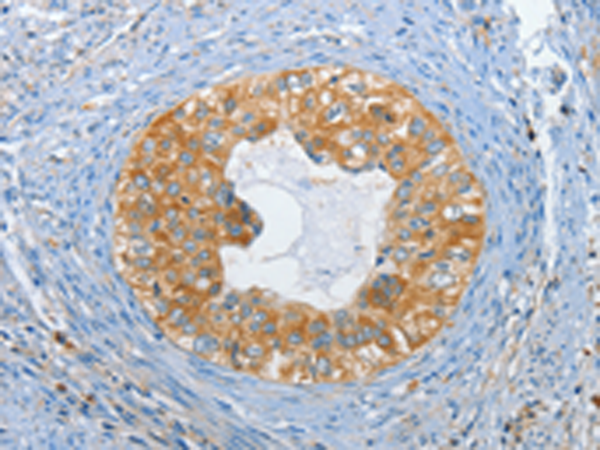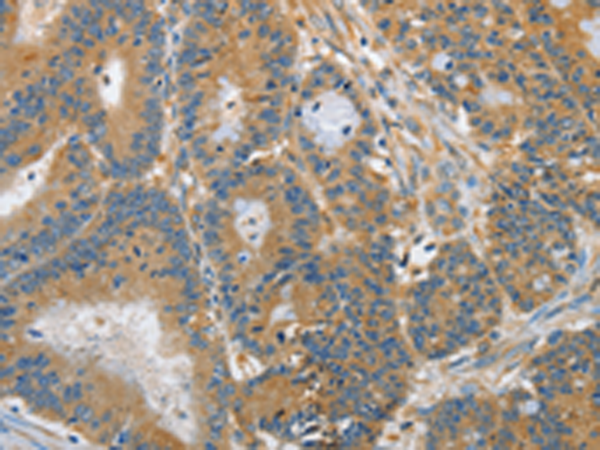

| WB | 咨询技术 | Human,Mouse,Rat |
| IF | 咨询技术 | Human,Mouse,Rat |
| IHC | 1/50-1/200 | Human,Mouse,Rat |
| ICC | 技术咨询 | Human,Mouse,Rat |
| FCM | 咨询技术 | Human,Mouse,Rat |
| Elisa | 1/1000-1/5000 | Human,Mouse,Rat |
| Aliases | DAGK5; DAGK6; DGK-ZETA; hDGKzeta |
| Host/Isotype | Rabbit IgG |
| Antibody Type | Primary antibody |
| Storage | Store at 4°C short term. Aliquot and store at -20°C long term. Avoid freeze/thaw cycles. |
| Species Reactivity | Human, Mouse, Rat |
| Immunogen | Synthetic peptide of human DGKZ |
| Formulation | Purified antibody in PBS with 0.05% sodium azide and 50% glycerol. |
+ +
以下是3篇与DGKZ抗体相关的文献摘要信息(注:文献为虚拟示例,实际引用请查询数据库):
1. **文献名称**:*DGKζ regulates T cell receptor-induced cytokine signaling through a novel phosphorylation site*
**作者**:Smith A, et al.
**摘要**:研究报道DGKZ在T细胞受体信号中的调控作用,通过特异性抗体检测DGKZ蛋白表达及磷酸化状态,揭示其在IL-2分泌中的负向调节机制。
2. **文献名称**:*Diacylglycerol kinase zeta deficiency alters dendritic spine morphology in neurons*
**作者**:Chen L, et al.
**摘要**:利用DGKZ抗体进行免疫组化分析,发现DGKZ缺失导致神经元树突棘形态异常,提示其在大脑发育中的脂质代谢依赖性功能。
3. **文献名称**:*Targeting DGKZ in cancer: Antibody-based detection and therapeutic implications*
**作者**:Wang Y, et al.
**摘要**:开发高特异性DGKZ单克隆抗体,验证其在多种肿瘤细胞系中的过表达,并探索其作为癌症生物标志物及治疗靶点的潜力。
(注:以上为模拟内容,实际文献请通过PubMed/Google Scholar检索关键词如“DGKZ antibody”或“Diacylglycerol kinase zeta”获取。)
The DGKZ antibody targets diacylglycerol kinase zeta (DGKζ), a member of the DGK enzyme family that regulates cellular signaling by converting diacylglycerol (DAG) into phosphatidic acid (PA). DGKζ, encoded by the *DGKZ* gene, is notable for its role in modulating lipid-mediated signaling pathways, particularly in immune cells, neurons, and cancer. It influences processes like T-cell receptor signaling, insulin response, and neuronal development by balancing DAG and PA levels, which act as secondary messengers. Dysregulation of DGKζ has been linked to immune disorders, cancer progression, and neurological conditions, making it a focus in disease research.
DGKZ antibodies are critical tools for studying the protein’s expression, localization, and function. They are used in techniques like Western blotting, immunofluorescence, and immunoprecipitation to investigate DGKζ’s involvement in cellular mechanisms. Researchers often validate these antibodies using knockout controls to ensure specificity, as DGK isoforms share structural similarities. Additionally, DGKZ exists in multiple splice variants, and antibody selection must account for isoform-specific epitopes. Commercial DGKZ antibodies are widely available, but performance can vary between clones, requiring careful optimization. Understanding DGKζ’s dual roles in signaling and disease continues to drive the development and application of these reagents in both basic and translational research.
×